Bosnia and Herzegovina, often hailed as one of Europe’s most underrated countries, offers a unique blend of natural beauty, rich Ottoman architecture, and vibrant city life. This guide is a collection of our whole team’s suggestions on the best places to visit, reflecting our shared passion for this enchanting country.
From the sprawling streets of Sarajevo, its biggest city, to the serenity of a tiny village, Bosnia and Herzegovina is a haven for nature lovers and cultural enthusiasts alike.
Join us as we explore these handpicked locations, each one a testament to why Bosnia and Herzegovina is a great place for an unforgettable experience.
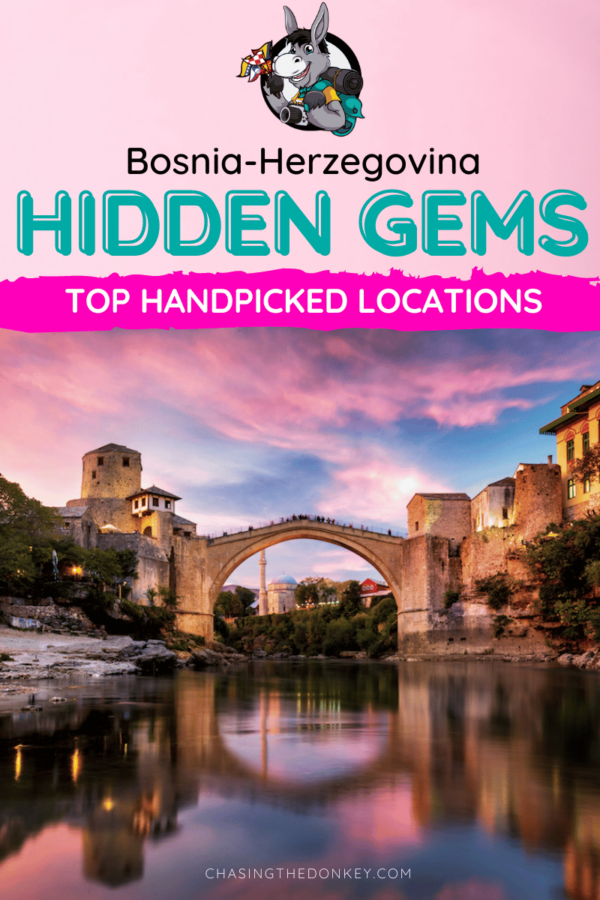
Bosnia and Herzegovina, one of the least visited countries in Europe (777,000 international tourist arrivals), is often forgotten while planning a backpacking trip through Europe.
Like many Balkan countries, it is stuck in the shadows of more popular tourist destinations in Western Europe. However, this is not for lack of natural magnificence, culture, history, affordability, or any quality that makes a travel destination great.
Scarred from the horrific civil war that tore the country apart in the 1990s, Bosnia-Herzegovina has slowly built its reputation anew, and whispers are starting to circle around travel circles once more.
Though the writing is on the walls — its dark history can be seen clear as day all around the country — with its craggily, heartbreaking remnants of the Bosnian war that devastated the country. What is left is a touching story of character and a united nation — one which speaks volumes of the human warmth and hospitality you will encounter.
Between its beautiful mountains, its gushing white water rivers, its crumbling medieval castles left in ruins, enormous and plentiful waterfalls, and affordable yet surprising ski slopes, there is a little something for everyone in this country, and what meets the eye is only half of what there is to see and do in Bosnia and Herzegovina.
We all fell in love with Bosnia Herzegovina, and we can’t get our minds off of it.
Although the country doesn’t see hordes of tourists like other places in Europe, there is still a warm and friendly tourist trail leading to some fantastic secrets in Bosnia and Herzegovina.
This list is a compilation of some of our favorite places to see in Bosnia and Herzegovina, so you don’t have to worry about missing out on the adventure.
Skip Ahead To My Advice Here!
Top Places In Bosnia And Herzegovina
As promised, we have put together a list of top places to see in Bosnia and Herzegovina to make planning for your vacation this year a breeze.
This list by no means encompasses all the things to do in Bosnia and Herzegovina, though we tried to cover a large range of activities and places all over the country.
Without further ado, here they are:
Historical & Cultural Sites
1. Sarajevo Bobsleigh Track
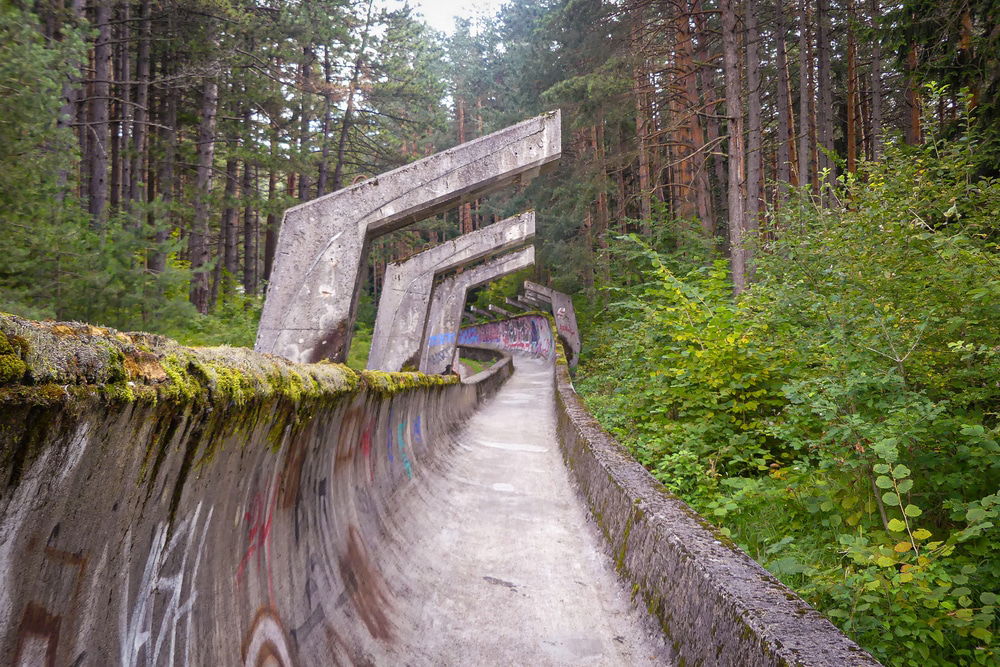
Finished in 1982 in preparation for the Winter Olympics, which Sarajevo had the honor of hosting in 1984, this 4,000-foot bobsleigh and luge track became a sort of symbol of national pride in Bosnia and Herzegovina.
It garnered a lot of attention due to the nature, scenery, and multitude of events held around the track’s vicinity during the World Games. Then, several years later, the track was able to be used for various things involving the World Cup competitions, and it seemed as if the investment in the track would pay long-lasting dividends.
However, then, the Yugoslav Wars began in 1991, and, like a majority of the country, the track turned into a battlefield. The nature of the track being curved and inclined made it a prime vantage point in the battle, and it was destroyed over the course of several years. The entire system became blanketed in bullet holes.
It was left in ruins but not forgotten. It has become a favorite spot for locals as a reminder of the times. Graffiti artists have taken a liking to it, too, covering the entire concrete course in fantastic, colorful street art.
It is being reconstructed in hopes of salvaging it somehow; however, tours can still be taken, and history can still be seen. Careful, though; many unexploded landmines still lay around the area — so don’t venture too far from the well-beaten path.
It is best to take a local or someone who knows the area with you to be safe. You can negotiate a fair price with a taxi as it is a reasonably popular tourist destination. It is one of the most popular tourist attractions in the entire city.
2. Museum Of The Assassination Of Franz Ferdinand
To stay with the war theme we have encountered across much of Bosnia and Herzegovina, you must visit the Museum of the Assassination of Franz Ferdinand.
Many people don’t know that on the 28th of June, 1914, World War I actually started in the heart of Sarajevo when the world was flipped upside down. Archduke Franz Ferdinand was shot and killed, which set off a hurricane of events leading to the First World War.
Now, a museum has been set up in the building across the street from the historical scene where you will learn that the young schoolboy who shot the archduke that fateful day was not acting alone.
Several assassination attempts failed that day, and the boy was supposed to only play a minor role in the plot to kill Franz Ferdinand.
With years and years of clashing empires in Europe, a situation such as this was all that was needed to set off a conflict to the magnitude of an eventual world war. And it all started in modern-day Bosnia and Herzegovina.
3. Old Jewish Cemetery Of Sarajevo
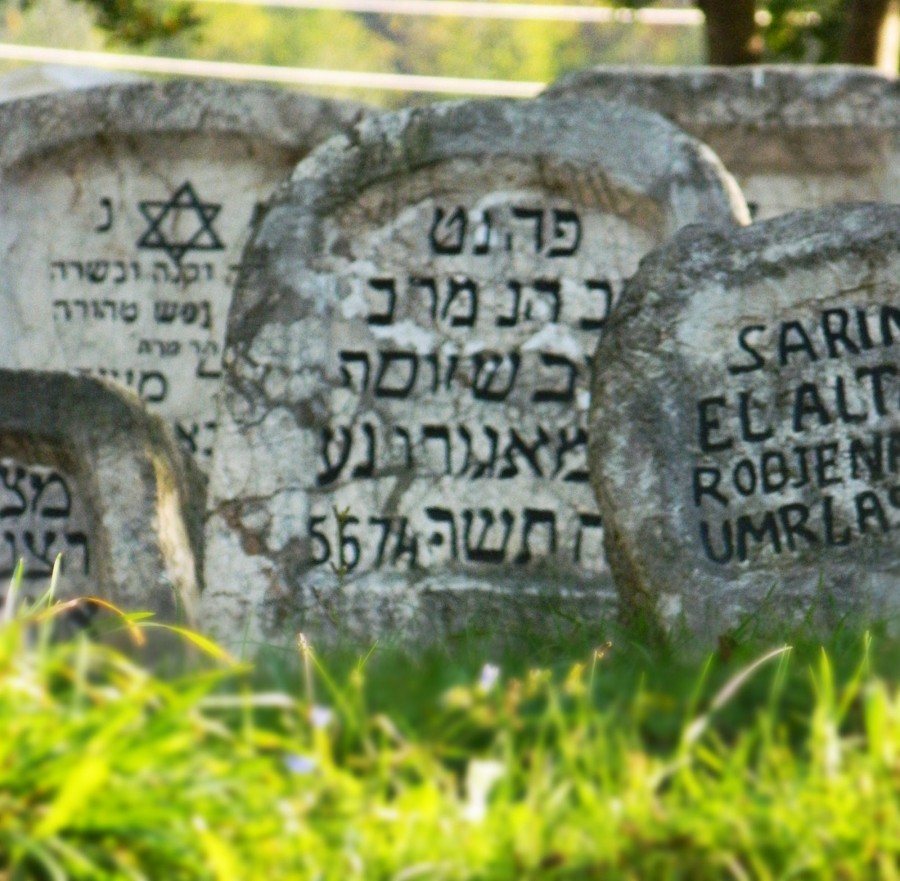
With nearly 4,000 centuries-old tombstones, weathered and in ruins, this cemetery was the site of an exceptional military position for battle during the Yugoslav War of the Nineties. Situated on the mountainside, the cemetery was sought after for its excellent vantage point. Because of that, the site was heavily defended, including landmines, among other tactics.
Because of the mines left over from the war, the cemetery became inaccessible for several years after the war had ended. It was estimated that the cemetery grounds still had over 70 undetonated landmines sitting in its thick grasses.
Today, the landmines are said to be cleaned up, and it has returned to a site where you can witness the history and acceptance of Sarajevo — which served as a refuge to Jews of the late 15th Century from hostile Spanish rule.
In town, you will find a Jewish quarter with a large synagogue and many other cultural and historical sites tailored to the religion.
4. Bascarsija
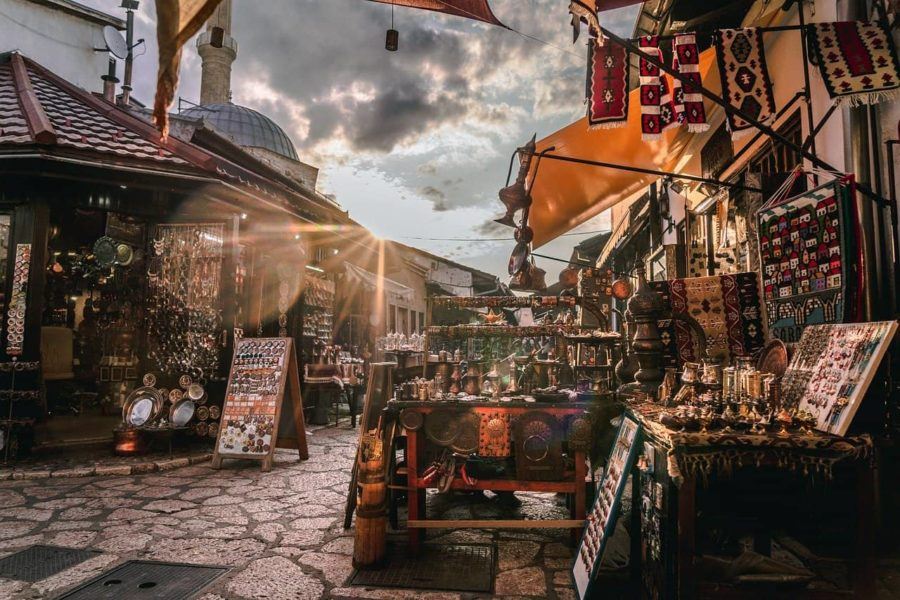
Situated along the banks of the Miljacka River, you can see one of the few remaining examples of oriental architecture in the Balkans at Sarajevo’s main attraction — the old bazaar, Bascarsija.
The name is derived from two words, translated to “Main Street.” Here, you can find all kinds of crafts and artisan work, ranging from pottery to jewelry and metalwork. However, many of the old artisan shops have now been converted to tourist souvenir shops and cafes to suit their visitors better.
Navigate your way through this network of narrow streets and try your hand at bargaining with the locals.
Although the area has been heavily influenced and affected by war-torn history, after the Second World War, the bazaar of Bascarsija eventually became a symbol of the city once more.
5. Dervish Monastery In Blagaj
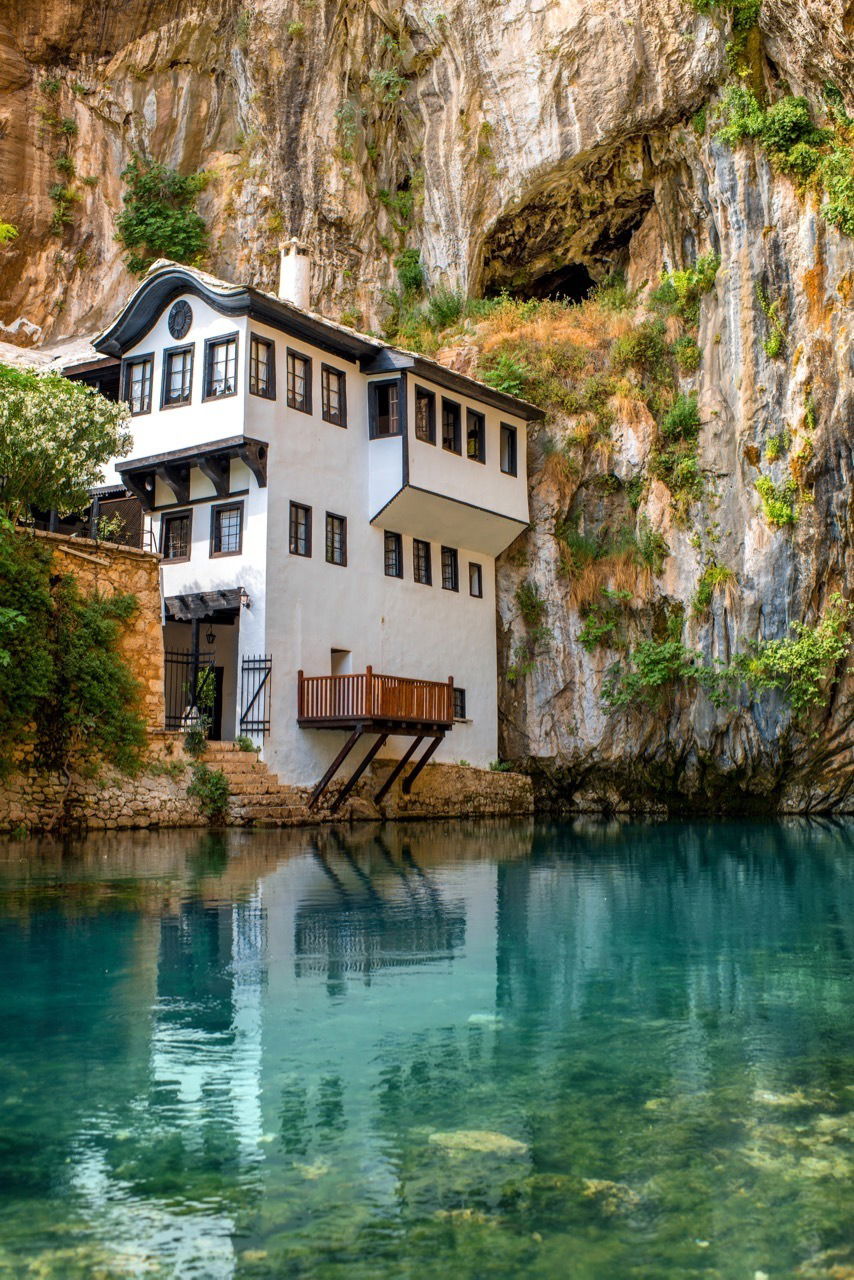
Only 15 minutes by car from Mostar lies the iconic Dervish monastery of Blagaj. This is another popular stop on bus trips from Dubrovnik to Mostar and makes for one of the best day trips from Mostar.
Known locally as the Blagaj Tekija, it’s a striking collection of historic buildings and the natural wonder that is the Buna River spring. Not surprisingly, this is a national monument in Bosnia and Herzegovina.
People have built picturesque monasteries all over Europe, but this one is among the most beautiful. This 16th-century Ottoman Empire Dervish monastery sits comfortably at the base of a huge rock wall while crystal-clear spring water calmly flows by. It’s as magical a place as you’ll find anywhere in the Balkans.
Several restaurants line the river, excellent spots for a relaxing lunch. Try a local trout dish!
Natural Wonders & Parks
6. Kravice Waterfalls
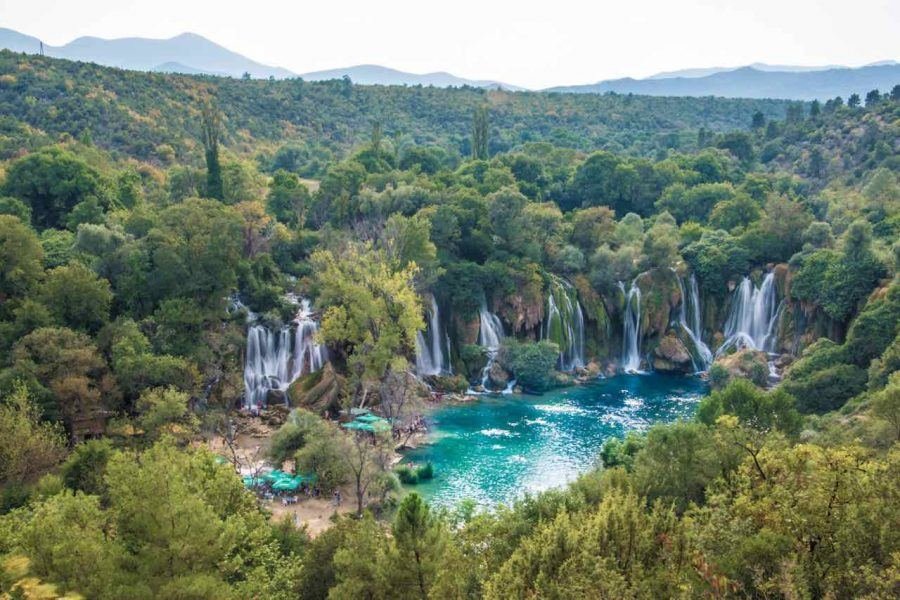
Creating a scene you might expect to find in South America or Africa, Kravice Waterfall sits deep in the thick of Europe’s last remaining jungle. Who knew there was a sister falls of the famed Iguazu Falls, and it is hiding in the Balkans of all places!
This impressive feat of Mother Nature drops as far as 85 feet and expands nearly 500 feet across several falls along a cliff’s edge. There’s even a rope swing!
The Kravice Falls are most easily visited on a day trip from the popular tourist town of Mostar in Southwest Bosnia and Herzegovina. It is like a miniature replica of the Iguazu Falls but without the hordes of people, which the South American falls now gets.
You can join a tour to visit this incredible area, but most people would recommend renting a car or even bargaining for a fair taxi ride to the falls rather than being stuck with a group in this magical place. Make sure you bring your camera; this is a photog’s dream!
7. Watermills Of Jajce

These little wooden huts had important use years ago. Now, they are a reminder of how life used to be. The town of Jajce in central Bosnia has always been a center of action. At the conflux of the Kravice and Vrbas rivers, the town has gained international fame for its breathtaking waterfall in the middle of town. It was once the capital of the (former) Kingdom of Bosnia.
It is a hotspot for tourism nowadays, given the serene nature, waterfalls, mountains, deep valleys, and fortified city walls and castles. Many people flock to this city on their Bosnian adventure – well, at least that is what Ana tells us.
And if you go further downriver, near the Pliva Lakes, you will find these huts that sit above rapidly flowing water — a symbol of ingenious engineering of simpler times. Instead of using one large waterwheel, these small water mills used the power of many smaller mechanisms in order to ground local farmers’ wheat into flour—an impressive idea of the Austro-Hungarian empire.
8. Sutjeska National Park
Deep within the heart of Bosnia-Herzegovina lies Sutjeska National Park, a hidden gem often overlooked by travelers.
This pristine wilderness offers a serene escape from city life, free from crowds and tourist traps. One of the park’s best-kept secrets is the enchanting Perucica Primeval Forest. Towering trees, untouched for centuries, create a fairytale-like atmosphere.
Hiking and wildlife spotting are prime activities here, with a chance to encounter brown bears, wolves, and chamois.
For the adventurous, a hike to Maglic Mountain, Bosnia-Herzegovina’s highest peak, offers breathtaking views of rugged landscapes. Be prepared for a demanding trek. Sutjeska National Park rewards those seeking authentic outdoor experiences with unparalleled beauty and tranquility.
If you crave a peaceful, off-the-beaten-path adventure in Bosnia-Herzegovina, make sure Sutjeska National Park is on your list.
9. Japodski Otoci, Una National Park
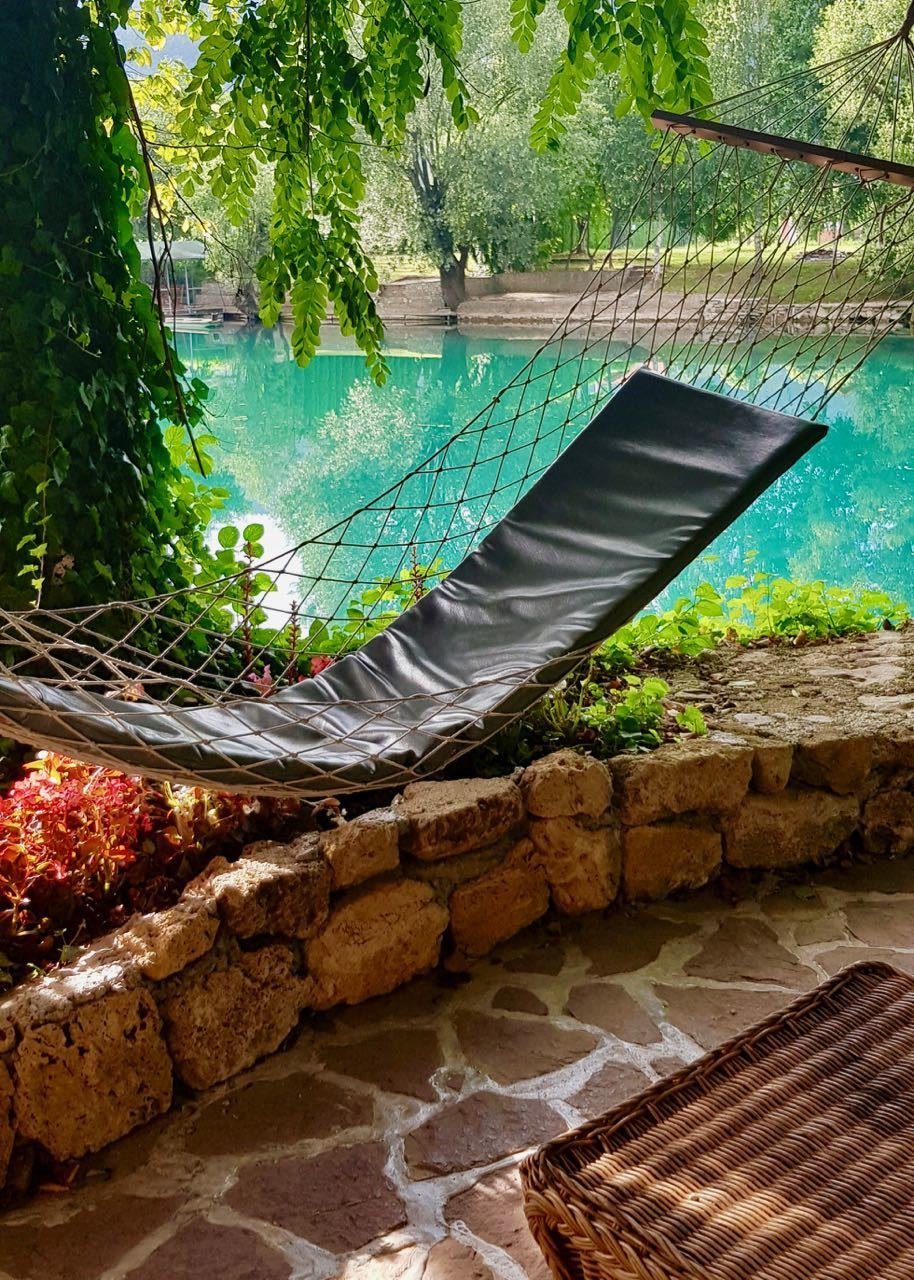
Located in the center of Una National Park, you will find Japodski Otoci, which basically translates to ‘Japanese Islands.’ Grab your walking shoes and take a wander around the area, which consists of five different islands linked by rivers and waterfalls.
This really looks like something from a fairytale book, and you’ll find a restaurant and plenty of spots to sit and catch your breath.
This is a sublime place to let the kids run free. There is lots of room for the little ones to spread about and loosen up.
10. Visoko – Mysterious Bosnian Pyramids
Visoko is a town just some 30 minutes outside Sarajevo, best known for its ancient pyramids. You read that right – while there’s no concrete evidence that the massive pyramid-shaped hills are burial sights, their appearance alone was enough to boost the area’s tourism significantly.
You can also explore underground labyrinths situated below the “pyramids,” as well as visit a museum that boasts a significant collection of items excavated there.
Whether or not you actually believe that these are the oldest human-made pyramids is up to you, but it’s certainly worth visiting and seeing them with your own two eyes. One of the top half-day trips from Sarajevo for sure!
Brands We Use And Trust
Iconic Structures & Architectural Marvels
11. Stari Most
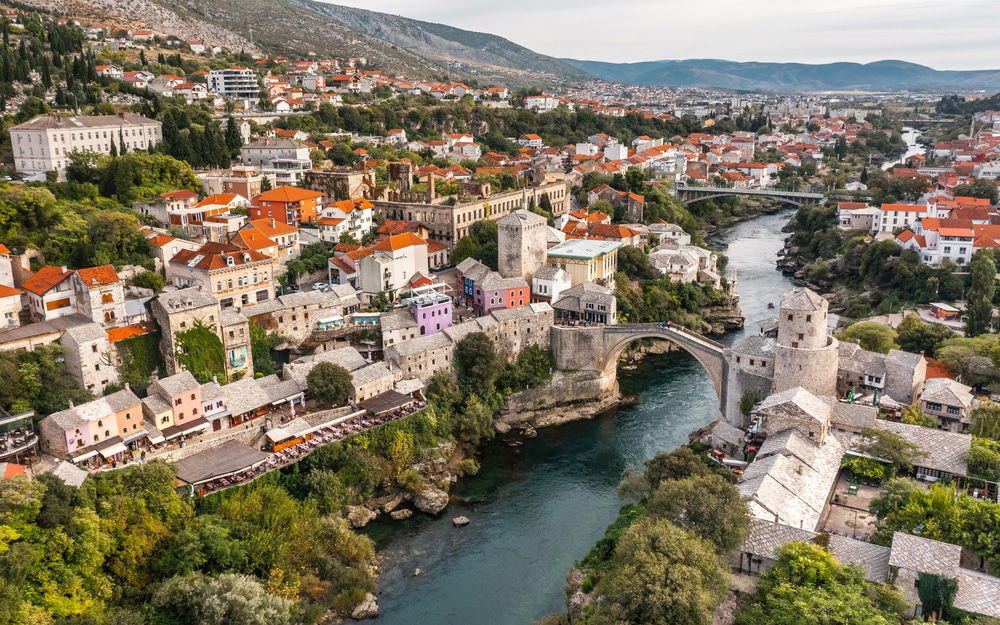
Speaking of Mostar, a visit to Bosnia and Herzegovina wouldn’t be complete without a stop in this tiny fairy tale town. And the prized attraction? The Old Bridge connects the two sides of the town across the Neretva River.
The Old Bridge of Mostar (Stari Most) was destroyed in a matter of seconds during the Yugoslav Wars by Croatia in November of 1993 — though its construction (starting in 1557) took nine years to complete during the Turkish Ottoman rule.
Magnificent because of its simplicity — only a single 100-foot long, 75-foot high bridge arching over the river — Stari Most was symbolic of the city of Mostar. When the famous Stari Most bridge went down, sadness befell the people of the city.
That’s why construction began at the beginning of the new millennium to rebuild the once grand structure to its former glory. In 2004, the bridge was completed again.
Today, it remains a symbol of Mostar, and many tourists and locals alike love to spend time around the bridge, taking in its beauty and symbolism.
If you are lucky, you may even visit while locals are doing their famed free-fall leaps to the river below. If you are brave enough, you can join them.
However, they will generally jump for any crowd who is willing to tip their performance at the right price.
12. Historic Village Of Počitelj
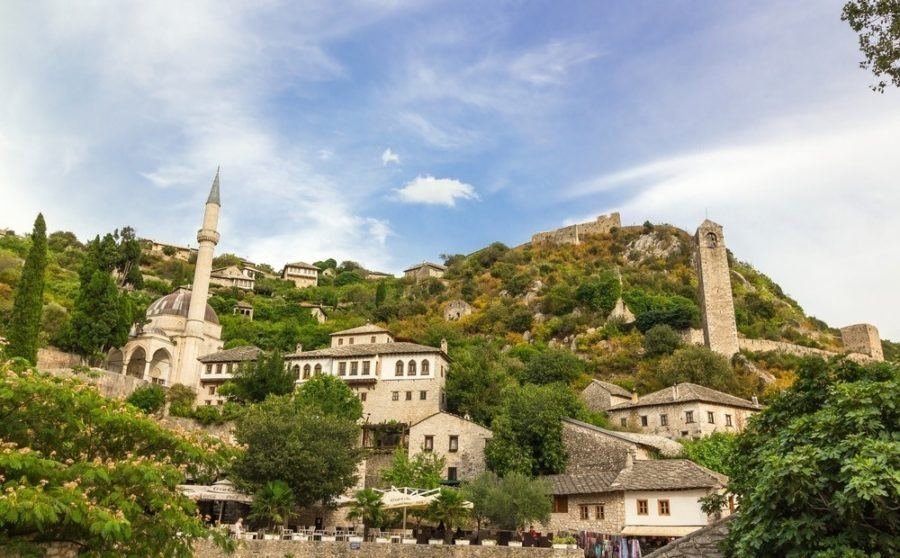
Sometimes called the “Pearl of Herzegovina,” the ancient village of Počitelj is a classic stopping point en route from Dubrovnik to Mostar. It lies just north of the Croatian border, about a 30-minute drive south of Mostar.
Located on the left bank of the Neretva River—which, by the way, also flows through the heart of Mostar and right underneath the Stari Most—Počitelj sits in a natural amphitheater and used to be a strategically important town. This is still evident because of the still-present fortified stone walls and a fortress. Other landmarks include an old mosque and a bell tower that offers astounding panoramic views.
This historic town thrived from the 16th to the 18th centuries. Its evolution happened over two distinct periods—the medieval and Ottoman periods. Currently, Počitelj is on the Tentative List of UNESCO, being considered for inclusion in the World Heritage Site list.
13. The Cable Car In Sarajevo
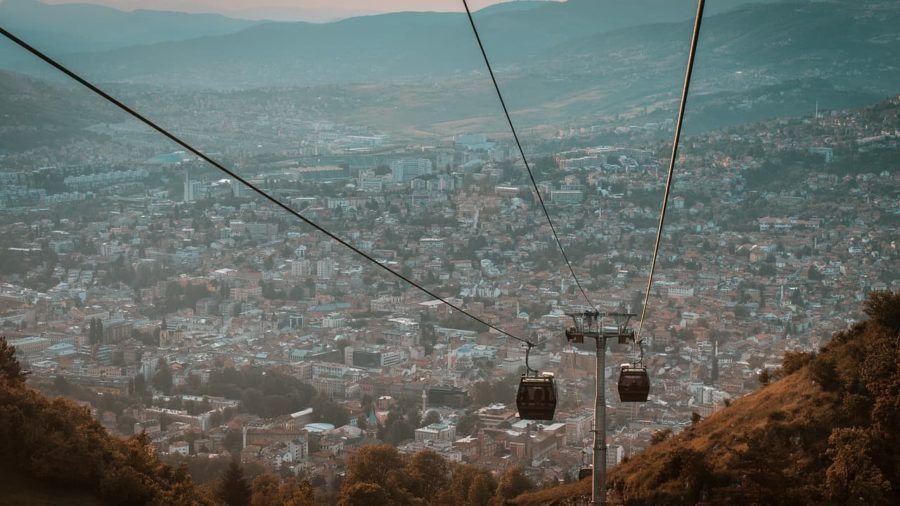
If you’re not afraid of heights, you should definitely ride the Trebević cable car. It’s fun, and you’ll get to experience incredible views of the city. Plus, if you ride the cable car, you can actually visit the Trebević mountain.
The cable car symbolizes the city; it was initially opened in 1959, but it was destroyed during the siege. It was reconstructed in the last few years, and it finally opened to the public in 2018.
The ride lasts about 7 minutes, and it’s quite fun. You can get out when you get to the top, or you can stay in the cabin and make your way back to the city – it’s up to you. If you decide to get out and explore Trebević, definitely visit the abandoned bobsleigh track mentioned previously, as that’s one of the most iconic spots on the mountain.
And if you’re not in the mood to walk around the mountain, you can complete the entire ride in some 20 minutes.
Unique Experiences & Activities
14. Eat Dinner At Restaurant River Dock In Bihać
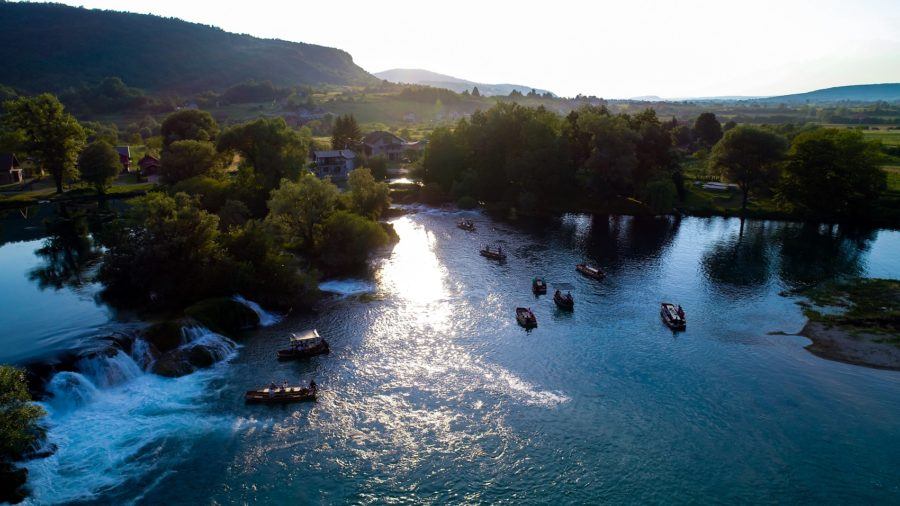
You won’t get a better location to eat dinner in Bihać than sitting on a wooden boat bobbing on the Una River in the little village of Ripač. Head to the River Dock for lunch or dinner (dinner is better, thanks to the sunset!)
As the last rays of sunlight glitter on the water’s edge, you’ll be off on your merry way, chugging slowly towards a waterfall as you enjoy traditional Bosnian food. Sounds made upright? I promise it is indeed true!
The surrounding green scenery makes you feel like you’re a million miles from anything, and the food is, of course, also rather outstanding. Cevapi and meats, trout, soups, you choose!
The experience lasts an hour, and if you are not keen on being on a boat for that long, then you can also enjoy the tasty local cuisine in the restaurant by the shade of the garden, where there is an ideal place for kids to roam and play!
15. Bullfights Of Grmec
https://www.youtube.com/watch?v=WkAycnmaNss
Grmeč is widely recognized for its bullfights, also known as Bull wrestling, within the Balkans. Referred to as the Corrida of Grmeč (Grmečka korida), these events have been held every first Sunday in August for more than 200 years, drawing in numerous spectators.
However, unlike in Spanish tradition, humans don’t intervene in the fight, and the fights never result in death. The fight follows the bulls’ natural instinct. Therefore, if a bull knows it is losing, he will back down from the other bull.
Bullfights like this take place all over western Bosnia, and they are still, to this day, revered as a showing of ancient origin. The fights are usually organized every first Sunday in August, so if you are traveling at this time and can stomach the thought of fighting, find yourself a ticket to the event and check out a pastime of Bosnian heritage.
16. Cross Mountain Of Medjugorje
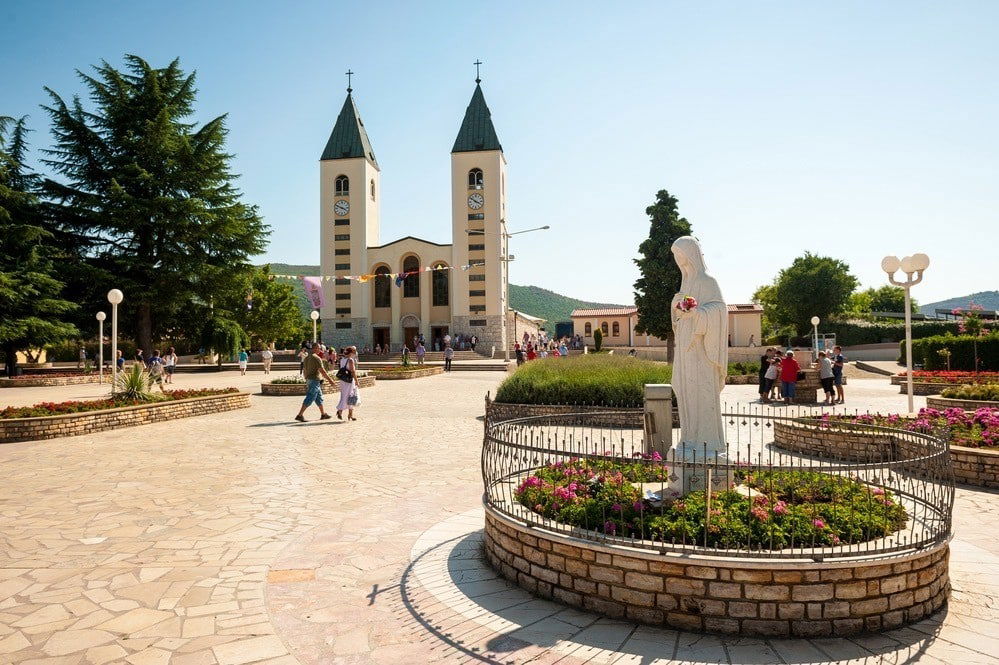
The Cross Mountain of Medjugorje is a hidden gem waiting to be explored. This lesser-known spot holds great significance for those seeking a unique spiritual experience.
The journey to this sacred site begins with a hike up a rugged path, surrounded by lush greenery and the sounds of nature. It’s not a strenuous trek, but it does require a bit of stamina.
At the summit, you’ll be greeted by a towering white cross that stands as a symbol of faith and hope. The view from here is simply breathtaking, offering panoramic vistas of the picturesque Herzegovina landscape. I’ve had the privilege of making this hike twice, once with three of my aunties aged between 50-70, and they managed it without any major issues – but it was a slow grind up. It’s a testament to the accessible nature of this hike.
Many visitors describe a sense of peace and tranquility that washes over them as they take in the serene beauty of the surroundings. While the Cross Mountain of Medjugorje may not be on every traveler’s radar, it’s a spot worth adding to your itinerary if you’re looking for a unique and meaningful experience.
Whether you’re a devout pilgrim or simply seeking a quiet escape from the hustle and bustle of everyday life, this hidden treasure promises a moment of reflection and connection with nature. So, lace up your hiking boots, embrace the adventure, and discover Cross Mountain’s serene charm for yourself.
War History & Remembrance
17. Sarajevo War Tunnel Museum
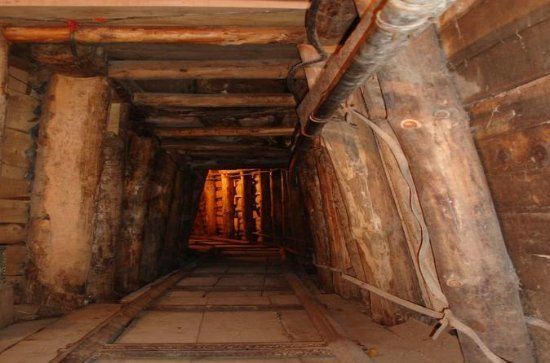
As is with most attractions around Bosnia and Herzegovina, there is a heavy war influence with much real history surrounding the site. As you can tell, this country was deeply impacted by violence and a dark past, and, as we said, the history is written on the walls.
The Sarajevo War Tunnel Museum is just another instance of history becoming a part of the country’s present. Construction of the tunnel, which was codenamed “Objekt BD,” began in 1993 to protect a large part of the city from the Serbian siege.
The tunnel was amazingly dug by hand and shovel, as you will be able to see upon visiting. After tireless work and days and days of occupation by laborers who were paid in cigarettes, the two sides of the tunnel finally met in the dog days of July to create a 2,500-foot shelter, which was strengthened by steel and concrete.
To finish, a miniature railway was built to shuttle in food and other supplies to those seeking refuge. Now, it remains an ode to the heart of the Sarajevo people.
18. Tunnel Of Hope
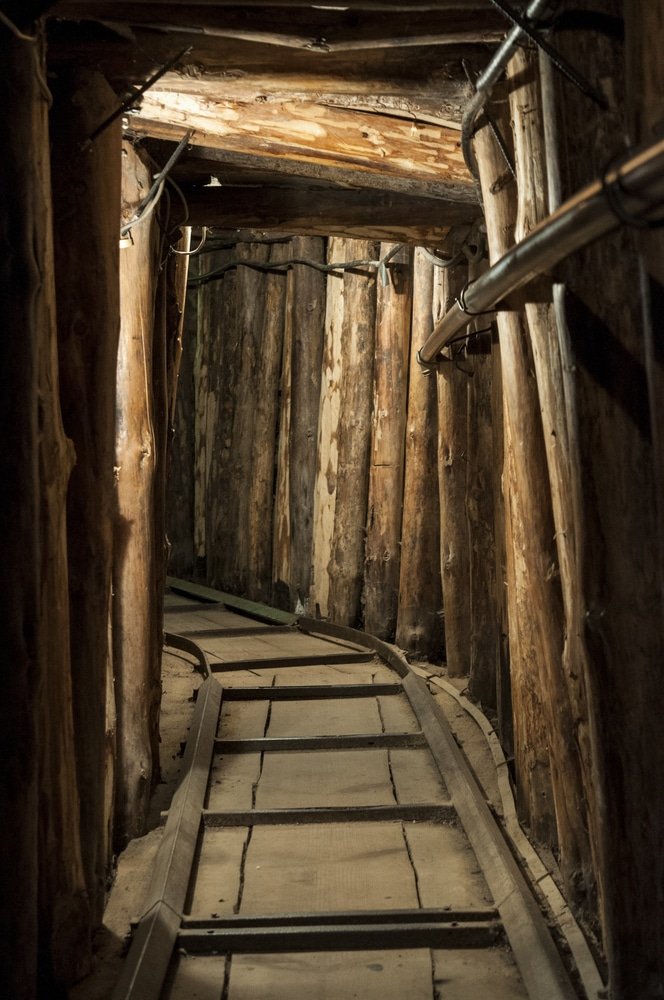
Hidden away in the heart of Bosnia-Herzegovina lies the Tunnel of Hope, a lesser-known gem that offers a unique glimpse into the country’s tumultuous history. Located on the outskirts of Sarajevo, this unassuming underground passage played a vital role during the Bosnian War in the early ’90s. While it may not boast grandeur or opulence, its historical significance is undeniable.
The Tunnel of Hope was a lifeline during the siege of Sarajevo, connecting the besieged city to the free territory beyond the airport. This narrow, dimly lit tunnel allowed supplies, food, and even people to pass through, offering a glimmer of hope amidst the chaos of war. Today, a portion of the tunnel is open to the public, providing a thought-provoking journey through the past.
You can explore the preserved section of the tunnel, viewing artifacts, photographs, and exhibits that tell the harrowing story of survival and resilience. It’s a stark reminder of the challenges faced by the people of Sarajevo during those dark days.
If you’re a history enthusiast or simply curious about this region’s turbulent past, a visit to the Tunnel of Hope is a must. It’s an opportunity to gain a deeper understanding of Bosnia-Herzegovina’s history and the indomitable spirit of its people, all while stepping back in time through this hidden corridor of hope.
19. Zeljava Airbase
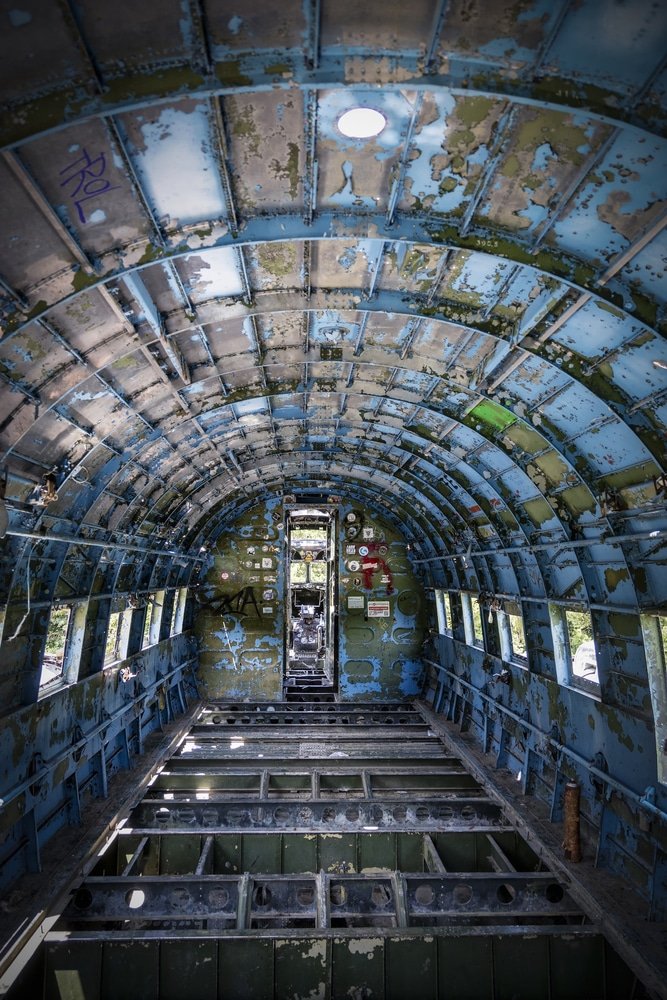
Objekat 505, as it is officially known, is just over the border with Croatia and is the largest underground airport base in the country.
Similar to something you might expect to see at Area 51 or in Star Wars, Zeljava Airbase served as a strategic command center for Bosnian and Herzegovinian defense during the Yugoslav War.
Secretly constructed in the middle of the 20th Century for a whopping six billion dollars (three times the annual budget of the Balkans’ two largest military forces in Serbia and Croatia), the airbase became a military astonishment — even built to withstand a blast from a nuclear warhead.
However, several years later, the Yugoslav National Army decided to destroy its functionality using built-in explosives to prevent it from being used by anyone else.
Unfortunately, because of the European refugee crisis, this site has become quite hard to reach. Because of its location near the border, many police patrol the area, and if caught, you will have to pay a fine. Though, we still think it is worth seeing, even if you have to risk it!
Move This Adventure To Your Inbox & Get An Instant Freebie

No spam. Unsubscribe at any time.
Major Cities & Urban Exploration
20. Banja Luka – The Second Largest City In BiH
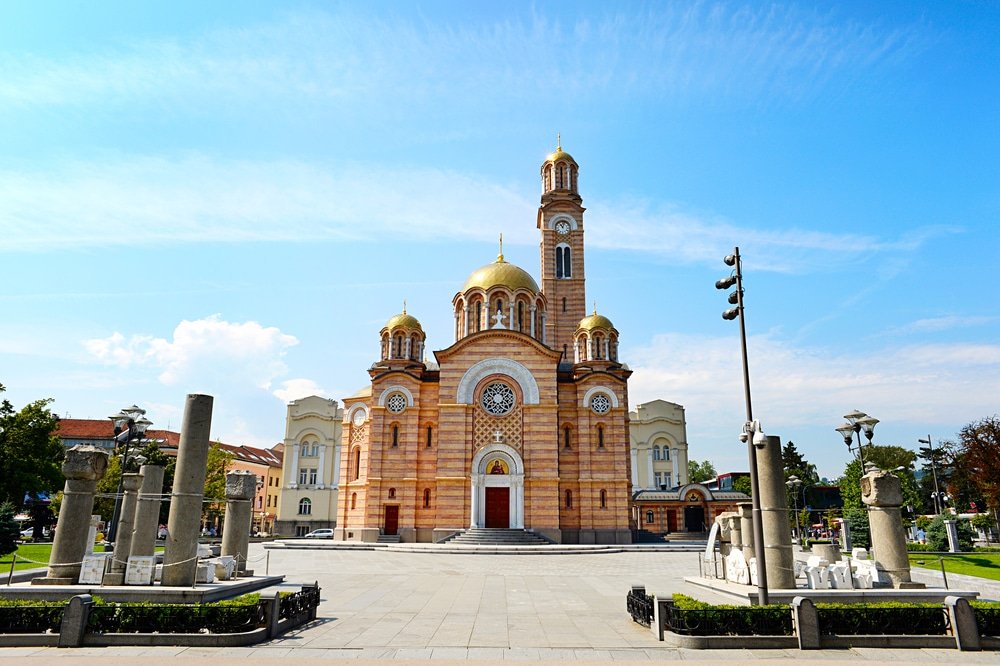
Banja Luka is a pretty picturesque place, and it’s somewhere you’ll definitely want to snap some photos. As you head to the High Street, you’ll see brightly colored umbrellas hanging over the street and lots of small boutique stores to check out.
Definitely visit the Cathedral of Christ the Saviour and head inside for fantastic architecture.
Kastel Fortress and Ferhadija Mosque are two other must-visits. This city is the second largest in the country, and there is a lot to see and do. You could stay here for a couple of days and enjoy the laid-back vibe. Oh, and the nightlife here is pretty vibrant, too, according to Adam.
Where Is Bosnia And Herzegovina?
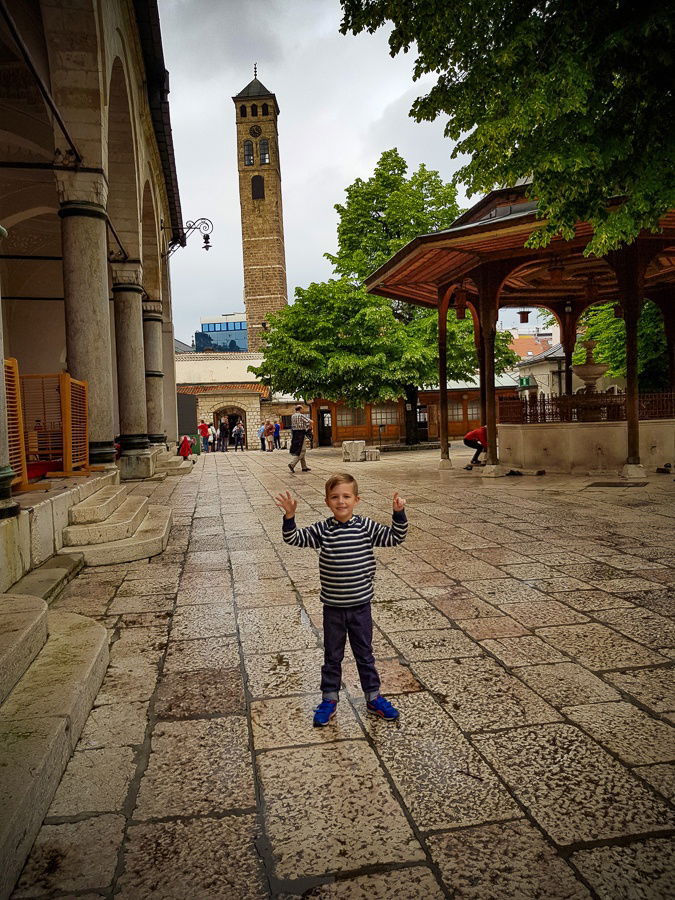
With just over 3.5 million people living in the entire country, Bosnia and Herzegovina certainly aren’t as busy as other Balkan countries. There is plenty of space to explore, too. It is one of the larger countries, landlocked between three other Balkans countries in the region’s center: Croatia, Serbia, and Montenegro.
People who visit Bosnia and Herzegovina often include surrounding countries in their itineraries. The entire region around the country is absolutely gorgeous and offers a multitude of nature scenes and things to do.
When To Visit Bosnia And Herzegovina
Bosnia and Herzegovina truly shines year-round, welcoming visitors through snowy winters and balmy summers. Known for its excellent skiing conditions, the country transforms into a winter wonderland, perfect for those who love the slopes. In contrast, the warmer months offer lush, well-kept hiking trails, ideal for exploring the great outdoors.
The country’s medieval castles are a delight under the summer sun, yet they gain a magical allure when draped in winter snow.
However, if skiing isn’t your main draw, consider a visit during the warmer seasons. This way, you can fully enjoy Bosnia and Herzegovina’s stunning rivers and lakes, which are at their best when the weather is mild.
| Region | Winter (Dec – Feb) | Spring (Mar – May) | Summer (Jun – Aug) | Autumn (Sep – Nov) |
|---|---|---|---|---|
| Sarajevo– Mountainous Region | -2°C / 28°F to 4°C / 39°F | 8°C / 46°F to 15°C / 59°F | 17°C / 63°F to 26°C / 79°F | 7°C / 45°F to 14°C / 57°F |
| Mostar – Southern Region | 5°C / 41°F to 10°C / 50°F | 12°C / 54°F to 18°C / 64°F | 26°C / 79°F to 32°C / 90°F | 10°C / 50°F to 16°C / 61°F |
| Banja Luka – Northern Region | -3°C / 27°F to 3°C / 37°F | 9°C / 48°F to 15°C / 59°F | 21°C / 70°F to 28°C / 82°F | 7°C / 45°F to 13°C / 55°F |
Final Word On Places In Bosnia And Herzegovina
Though Bosnia and Herzegovina isn’t the first country on your list of places to see in Europe, it doesn’t mean it is missing the pizazz, which makes it special.
We love this country, and part of the reason why is because we feel we have really beat the crowds to this beautiful country. It still feels like an unfound gem within a region that is growing in popularity every day.
As we conclude our journey through Bosnia and Herzegovina, remember that each corner of this country boasts some of the most beautiful places on earth. Whether you seek tranquility or adventure, Bosnia and Herzegovina is the perfect place, genuinely worth visiting for a memorable and enriching experience.


I am from Pakistan i am interested to visit Bosnia send me invitation fee details thanks
So disappointed you are promoting bull fighting. This is animal abuse and not justified no matter the culture or country. Btw, letting your kids run around unsupervised might be great for you but ruins the experience for other guests.
There is no human interaction in the bull fights and the bulls do not die, the dominating bull wins, and the other backs down and walks away. Get a grip Mate.